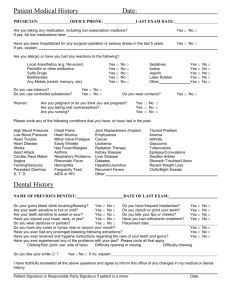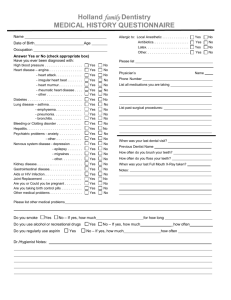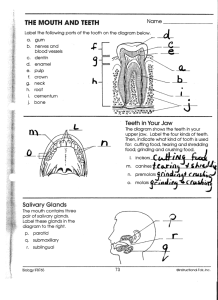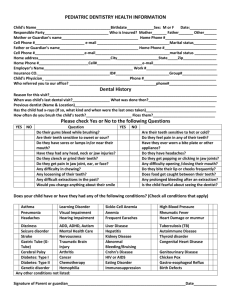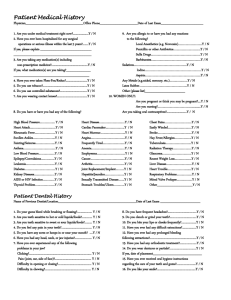File - Crystal Taren
advertisement
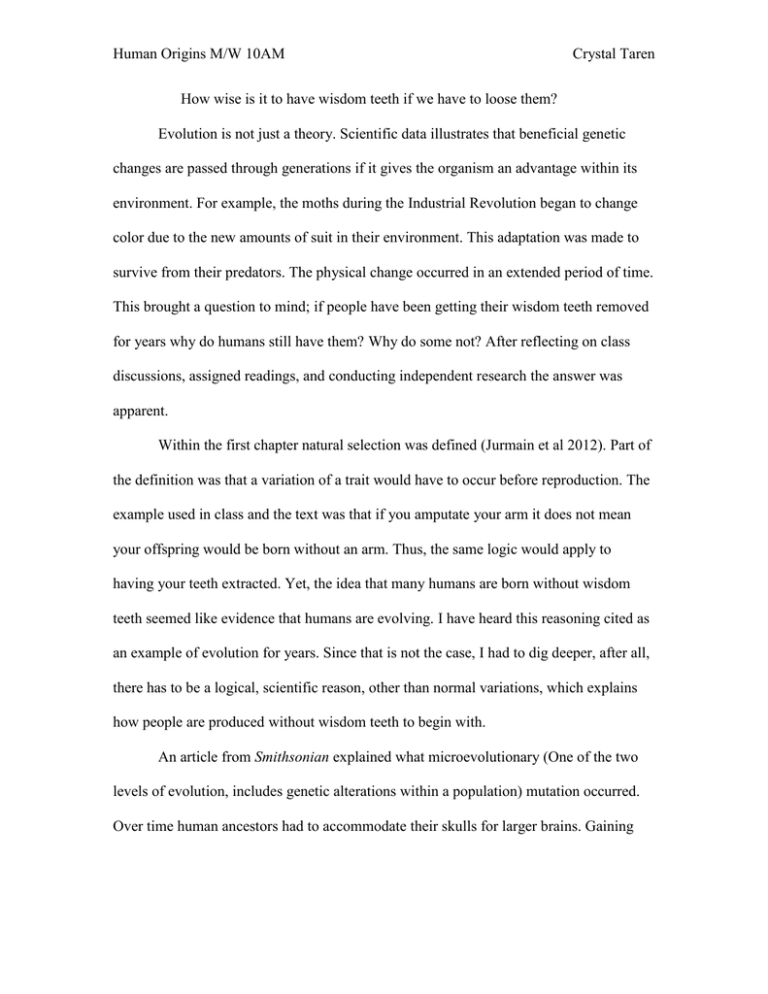
Human Origins M/W 10AM Crystal Taren How wise is it to have wisdom teeth if we have to loose them? Evolution is not just a theory. Scientific data illustrates that beneficial genetic changes are passed through generations if it gives the organism an advantage within its environment. For example, the moths during the Industrial Revolution began to change color due to the new amounts of suit in their environment. This adaptation was made to survive from their predators. The physical change occurred in an extended period of time. This brought a question to mind; if people have been getting their wisdom teeth removed for years why do humans still have them? Why do some not? After reflecting on class discussions, assigned readings, and conducting independent research the answer was apparent. Within the first chapter natural selection was defined (Jurmain et al 2012). Part of the definition was that a variation of a trait would have to occur before reproduction. The example used in class and the text was that if you amputate your arm it does not mean your offspring would be born without an arm. Thus, the same logic would apply to having your teeth extracted. Yet, the idea that many humans are born without wisdom teeth seemed like evidence that humans are evolving. I have heard this reasoning cited as an example of evolution for years. Since that is not the case, I had to dig deeper, after all, there has to be a logical, scientific reason, other than normal variations, which explains how people are produced without wisdom teeth to begin with. An article from Smithsonian explained what microevolutionary (One of the two levels of evolution, includes genetic alterations within a population) mutation occurred. Over time human ancestors had to accommodate their skulls for larger brains. Gaining Human Origins M/W 10AM Crystal Taren space in one area of the head meant that space was being lost somewhere else. That place was the jaw (Dunn, 2010). One of my favorite explanations found was from LTC James J. Lane (Dental Corps), “Today we seldom attack our enemies by trying to incise jugular vein and although some people like their steaks on the rare side, these are along way from the raw meat which was the diet of our distant forefathers.” Lane then goes on to cite physical evidence of the mandible size, and other elements of the jaw structure being smaller in today’s skull. In fact, the differences can be seen periodically when comparing the skulls between eighth, twelfth centuries, and today (Lane, 1970). Another piece of evidence is that pre historic man’s jaw could easily accommodate 32 teeth (Edmonds, 2008). Bigger brains meant that humans had more to work with intellectually, but smaller jaws meant that eating like our ancestors did was more difficult. With larger brains humans had a better ability to problem solve (Dunn, 2010). Other indicators that support the idea that humans had evolved and evolution exists are the cultural shifts that were experienced as their anatomy changed. For example, society’s use of fire to cook and soften meet, and the invention and use of utensils occurred around the same time that physical changes were prevalent in the skull (Edmonds, 2008). After discovering evidence that supports the initial claim that bigger brains caused our jawbone to evolve, I was curious how the opponents of evolution explain the difference. First, the sources I found to support the initial claim appear to be creditable. My primary source, from the Smithsonian, is responsible for some of the nations most amazing museums, and research. The article by LTC Lane was published by the United States Army Medical Divison, which has no ulterior motive when presenting the Human Origins M/W 10AM Crystal Taren information. This source may be outdated since the article was published in 70’s, but my other sources are more recent, and support the claims made in this article. Opposition to the initial hypothesis explained by Creation Today (a procreationism website) provides few explanations, and no physical evidence to discredit evolution. First point made is that wisdom teeth still function, as they should, to chew food, this means that it’s not a vestigial organ (useless). According to the article the definition of evolution is to improve or add features. So wisdom teeth do not correspond to their definition because a lack there of, would not imply evolution. The second reason the article presented was from an orthodontist, Dr. Jack Cuzzo. Cuzzo’s explanation states due to growth hormones in food, and eating more cooked foods results in lack of jaw development. “This is a environmental factor, not an evolution one,” says Cuzzo, humorous, since the definition of evolution are adaptations made due to our environment (Jurmain et al 2012). This article goes on ludicrous statements such as; the world isn’t following God’s plan so we are paying for it with poor health that includes poor dental hygiene. Hasty generalizations like this are dangerous, especially when this source came up 4th on the list when I google-ed evolution and wisdom teeth. Personally I always try to keep the seven fallacies of logic in mind when evaluating an idea. The majority of the creationism websites participate is using these fallacies. For example, faulty use of authority, just because one orthodontist has the opinion it does not make it true. In addition the article had a bandwagon appeal to it. If you don’t accept their explanation you will be condemned. In addition, this source did not supply any hard evidence to support their claims and expects the reader to hop on to their Human Origins M/W 10AM Crystal Taren bandwagon. Science occurs because people ask questions. What kind of science do these doctors support if they don’t encourage humans to evaluate the topic for themselves. Personally I will stick to the premise that has physical evidence supporting the claim. Human Origins M/W 10AM Crystal Taren Sources Cited Dunn, Rob. 2010. The Top Ten Daily Consequences of Having Evolved. The Top Ten Daily Consequences of Having Evolved. http://www.smithsonianmag.com/science-nature/The-Top-Ten-DailyConsequences-of-Having-Evolved.html?c=y&page=2 Edmonds, Molly. 2008. "Are people without wisdom teeth more highly evolved?" http://science.howstuffworks.com/environmental/life/evolution/no-wisdomteeth.htm. Hinton, John. “Things that negate evolution: wisdom teeth” http://www.creationtoday.org/things-that-make-evolutionists-look-stupid%20wisdom-teeth/ Lane, LTC Jame J. 1970. Get Smart On Wisdom Teeth, Medical Bulletin, Vol. 27, no. 3, Mar. 1970, p. 102-104 Jurmain, Robert Kilgore, Lynn Trevathan, Wenda. 2012. Human Origins Evolution and Diversity. p.3-22
